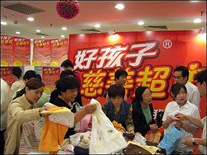| Tools: Save | Print | E-mail | Most Read |
| Charity Supermarkets: A New Approach to Poverty Relief |
| Adjust font size: |
Liu is one of those who've benefited from the charity supermarket in the Yuanjia community where all the 187 local needy people can "buy" daily necessities donated by residents just by exchanging convertible vouchers especially produced for them. Such charity shops, also called "sunlight" or "benevolence" supermarkets, are part of a Chinese government initiative to assist low-income families. They first appeared in These charity supermarkets now have complete networks established for receiving donations including a main reception center and local branches in many different communities. In These supermarkets all have uniform management. Regulated by the local municipal civil affairs bureaus and charity foundations, donated items are first collected at main centers and then dispersed to local outlets. In Information technology is widely used in these supermarkets. In Much thought has also been given to image of these shops. The accounts are made public on a regular basis. Publicity drives explaining that the shops help needy people are organized during donation weeks and handbill distribution is carried out. A number of charity supermarkets have gone as far as to build their own websites. The appearance of these supermarkets has changed the way needy people are assisted. They'll never receive donations from officials escorted by an imposing group of helpers. Instead they can go to the charity supermarkets to "buy" their daily necessities themselves using the convertible vouchers especially produced for them. "I had to shamefully explain my poor family situation and fill in different forms in public view to receive aid or clothes years ago," said Sun Wei, a postgraduate student in the East China Normal University. Chinese experts explained that needy people had concerns over privacy and their self-respect had to be considered especially when children were involved. They said the charity supermarkets had gone some way to solving this problem. The charity supermarket project is still in its early stages and only a limited number of needy people can access the new system. However, the Ministry of Civil Affairs in collaboration with the State Administration of Taxation and the Ministry of Finance are deliberating on how to encourage those who are wealthy to give to charities by creating new policies which could perhaps involve an element of tax exemption set against charitable donations. Charity service centers like the supermarkets are expected to become part of everyday community life in
( |
| Tools: Save | Print | E-mail | Most Read |
 |
| Related Stories |
|
Product Directory China Search |
Country Search Hot Buys |

